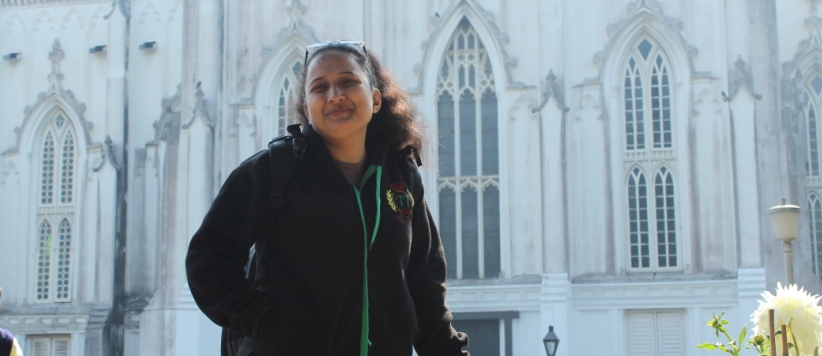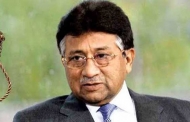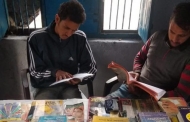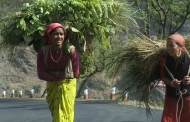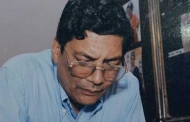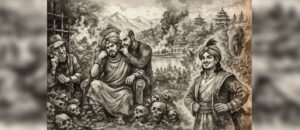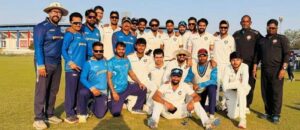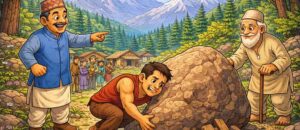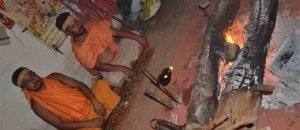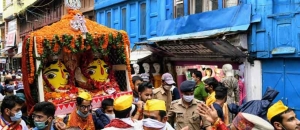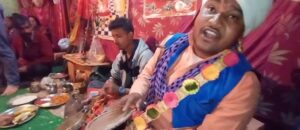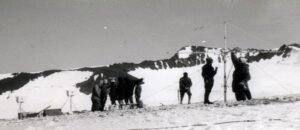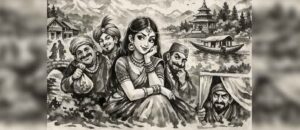She looks like an average mountain girl when you meet her for the first time. Her initial conversation would be simple and would conform to your initial impression of hers. Then you must watch the films she has made. She would suddenly transform into something as strong as a mountain. We are talking of Pushpa Rawat, a young talented film director from Uttarakhand.
During the Second Haldwani Film Festival in 2016, Suchitra Awasthi had interviewed her. Suchitra is an Assistant Professor of English at the Uttarakhand Open University
पोस्ट को हिन्दी में पढ़ें: उत्तराखण्ड मूल की फिल्म निर्देशिका पुष्पा रावत का इंटरव्यू
Suchitra Awasthi: Could you please introduce yourself to our readers, Pushpa ji?
Pushpa Rawat: I hail from Chaukhutia block, Almora. However, I gained education from Ghaziabad. I am a Post Graduate in Philosophy from Vidyawati PG College, Meerut University, Ghaziabad.
Suchitra Awasthi: How did the idea of film making come to you?
Pushpa Rawat: Camera has always been an object of fascination for me. As a child I experimented with the camera a lot. Earlier, when I did not have a camera of my own, I would borrow one from my neighbours and take pictures. I was an avid amateur photographer and shot whatever captured my attention. I did that because I wanted to see things from my perspective. I would also save money to buy film rolls. My mother would reproach me severely when it came to developing the roll as it was a costly affair for a middle class family where every penny counted.
In 2007, when I was in standard twelve, I participated in a photography workshop which was organized by National Bal Bhawan, New Delhi. We had Mr. Asim Bhattacharjee, the renowned photographer as our resource person. He taught us various aspects of photography.
Thereafter, consecutively, a ten-day workshop on videography was also organized at National Bal Bhawan. Most of my friends who had attended the photography workshop opted out of the videography workshop as a sight-seeing tour to Nainital was also being organized simultaneously. I too had two options, whether to attend the workshop or to join my friends on the tour. I thought to myself that I might not get an opportunity to learn skills in videography again, whereas Nainital will always be there to welcome me wholeheartedly anytime.
As I saw this as a good opportunity to pick up some skills in videography, I made up my mind to attend the workshop. Ms. Anupama Srinivasan, the eminent documentary film-maker gave us important tips on documentary film-making and initiated me into film-making. Here I also made my first documentary film, along with seven or eight more participants, as part of the Programme. This was a film on visually impaired people and was called Nazar.
Suchitra Awasthi: Have you attained any other formal training in film-making besides in this workshop?
Pushpa Rawat: No, I haven’t taken any other formal training in film making besides this one. For me Ma’am Anupama has been my greatest mentor and guide. She has been instrumental in honing my skills as a film-maker. She freely discusses idea with me and also offers suggestions which have been very helpful in my growth as a film-maker. Other than Ma’am, my life has been a great teacher. The biggest lessons I learned in life are through my mistakes. I say it with pride today that by God’s grace, I have managed to overcome my hurdles and have been forging ahead in life, always.
Suchitra Awasthi: You’ve also been associated with Mr. Rajiv Mehrotra. He was the producer of your film Nirnay. Could you please share some of your experiences with him?
Pushpa Rawat: Well, I have never met Mr. Rajiv Mehrotra in my life. As he is the founder and managing trustee of the Press Service Broadcasting Trust, he got my film sponsored and financed from the PSBT. Although I have never met him but he has always been very supportive of me. When my film was screened at the Dharamshala International Film Festival, he sponsored Ma’am Srinivasan’s and my air ticket and managed other things for us as well.
Suchitra Awasthi: Coming to your film Nirnay, a film in which you narrate the story of your life blatently. Do you, at this juncture, have any regrets of talking about your life so candidly in the film?
Pushpa Rawat: No, I have no regrets at all. Moreover, I never saw Nirnay as a film confined to my life. Through the medium of the film I wanted to lash out at the conservative nature of our society. I also championed the cause of some of my other female friends through the film. While filming, I realized that it is not just the girls who are victims of conservatism but the boys too bear the brunt of it to a large extent.
I have never believed in running away from problems and have always faced problems that confront me with a brave heart and this was the message that I wanted to convey through my film. Moreover, as the film won me the coveted Pramod Pati Award for the most innovative film at MIFF 2014, I feel good about it.
Suchitra Awasthi: How did the idea of Mod come about?
Pushpa Rawat: My brother Ankur was the reason behind the film. Ankur and his gang represent the “rebels” of our society. Ankur is highly temperamental and can always be seen playing truant; from school, from home, from everywhere. His mercurial nature appalled me considerably and I wanted to understand him, so I made this film about his life. During the making of the film, a lot many things about Ankur started opening up to me.
There is a shot in the film where Ankur yells at me saying, “This girl who goes around with this goddamn camera, I am angry with her!” This remark completely blew me up. Not just that, it also made me wonder whether I too was to blame for his predicament.
I realized that perhaps I being an older sister, in the garb of being overprotective, was actually messing up his life too. Gradually as Ankur and his friends started opening up with me, I realized that they were more vulnerable than being notorious. Thus, this film gave me an opportunity to understand those “ruffians” who are seen as nothing more than miscreants in society.
Mod was made from the money I received from TISS_SMCS fellowship and I really am indebted to Tata Institute of Social Sciences for the honour. Had I not received this fellowship, this film would not have seen light of the day.
Suchitra Awasthi: Pushpa ji, tell us something about your other projects and also how your films have been received by the audience?
Pushpa Rawat: Apart from Nazar, Nirnay and Mod I have also made a short documentary Kyon. Kyon was a group project based on gender violence. I shoot for other people too.
Suchitra Awasthi: Who all have you shot for?
Pushpa Rawat: Suchitra ji, I don’t keep an account of all that. I just work and forget about it. To keep moving is the motto of my life. If I keep an account of the things I do for others, how am I to maintain space for my future endeavours? Till recently I was working with Khabar Lahariya, a local language weekly brought out by women from marginalized sections of society. I also have been writing scripts, editing and directing films for some organizations.
To answer your previous question, I feel elated seeing the response of the audience. It fills me up with dignity and confidence and I get more committed and honest about my work.
Suchitra Awasthi: Would you like to tell something about your future projects to our readers?
Pushpa Rawat: I don’t plan my future. I cross my bridges as they come.
Suchitra Awasthi: Now-a-days documentary films are redefining the tenuous line between fact and fiction and are more of hybrids. Do you approve of this hybrid-genre?
Pushpa Rawat: Well, I have never been an orthodox. I believe in moving with the times. You just can’t hold time. Can you? If one doesn’t tamper with the essence of the story, keeps the base intact and paints his or her own picture then I see no harm in that. After all everyone has his or her own style.
Suchitra Awasthi: Where do you draw your inspiration from?
Pushpa Rawat: Ma’am Anupama has been my greatest inspiration. She is my GOD! Besides her, my father has also played a major role in shaping my personality. He has always been very encouraging and Mod has been possible because of him. At times when the tides of life are against you, they too give you enough reasons to swim on.
Suchitra Awasthi: Any message that you would like to convey to our readers?
Pushpa Rawat: I would like to tell the readers that one should be very clear about his or her priorities and start thinking for his or her own self. One must never be hesitant about pursuing his or her dreams. It’s okay to make mistakes. If you fall, you should be resilient enough to rise up again.
In society, especially in states like Uttarakhand, women are not allowed to undertake enterprising works. But one needs to have faith in his or her abilities and keep on marching forth.
I too was not encouraged earlier on, but as I had clarity about my dreams I overcame my hurdles. Same has been the case with Ma’am Anupama. She comes from a very affluent family, a family of civil servants and scientists, but she too was not encouraged by her family in the initial phases of her career.
Perhaps this was because her parents had high hopes from her as she was an exceptionally bright student too, but she waged her battles and today she is one of the finest documentary film maker in the entire world. So you have to revolt at times and I see no harm in it as long as you can differentiate between right and wrong.
To conclude, I would request the parents of today to develop an understanding with their children so that they are able to realize their potential to the fullest.
काफल ट्री वाट्सएप ग्रुप से जुड़ने के लिये यहाँ क्लिक करें: वाट्सएप काफल ट्री
काफल ट्री की आर्थिक सहायता के लिये यहाँ क्लिक करें



